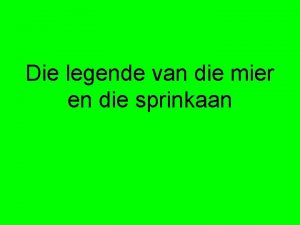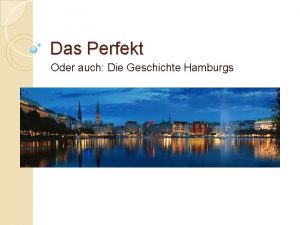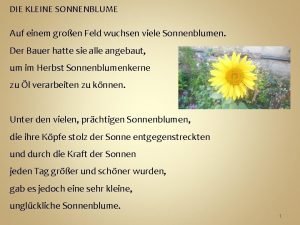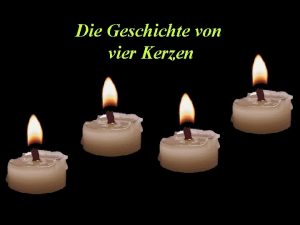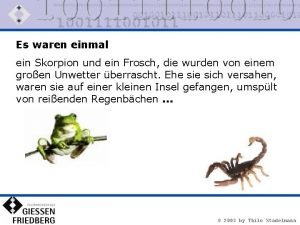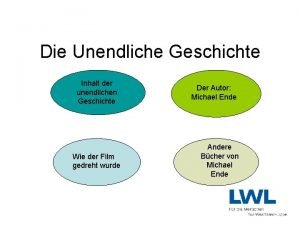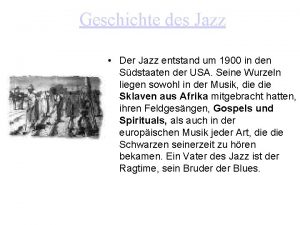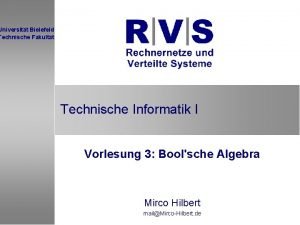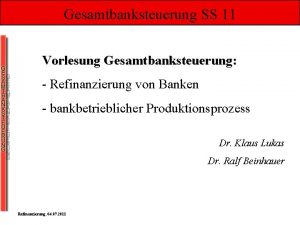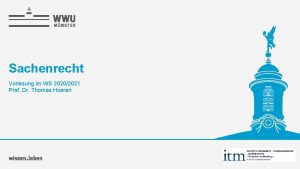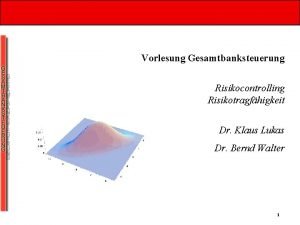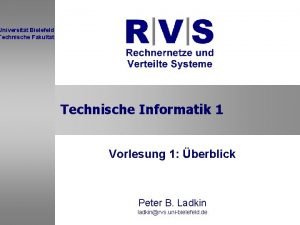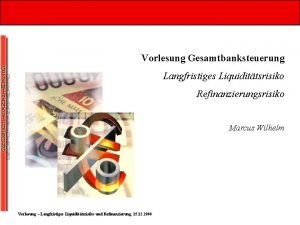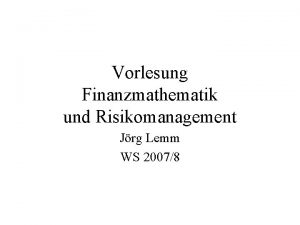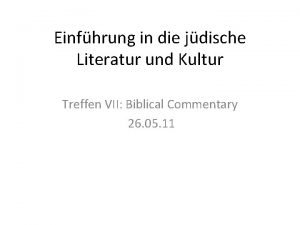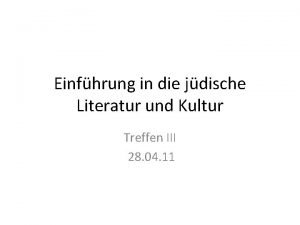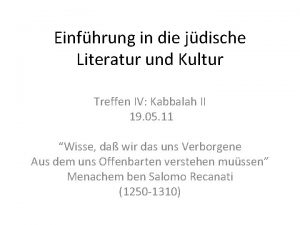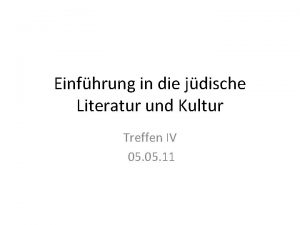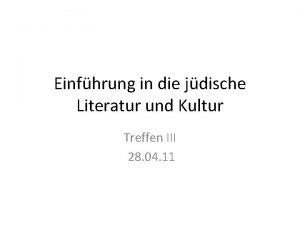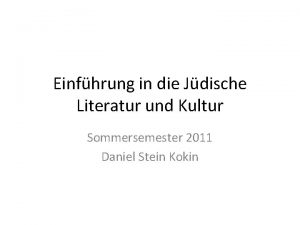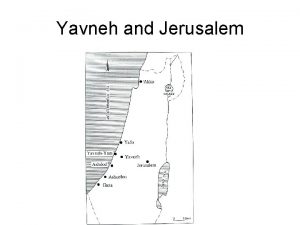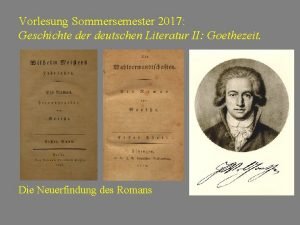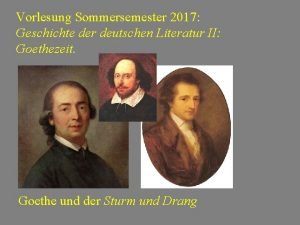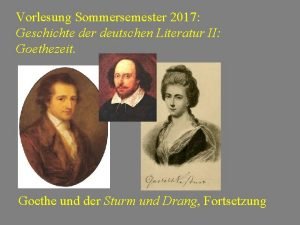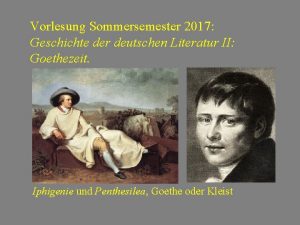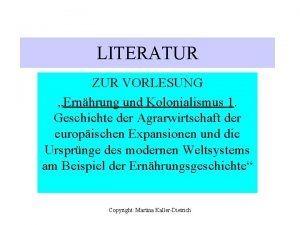Vorlesung Einfhrung in die Jdische Geschichte und Literatur





![מנסעפ The open Mem and the closed Mem [denote] open teaching [Ma’amar] and מנסעפ The open Mem and the closed Mem [denote] open teaching [Ma’amar] and](https://slidetodoc.com/presentation_image/540fd90ee6c86016351af016f0b6b584/image-6.jpg)
![ש ת אמת שקר • Shin [stands for] Sheker [falsehood]; Taw [for] ‘e. ש ת אמת שקר • Shin [stands for] Sheker [falsehood]; Taw [for] ‘e.](https://slidetodoc.com/presentation_image/540fd90ee6c86016351af016f0b6b584/image-7.jpg)



![Multiple Meanings in Scripture 1) Ben Bag sagt: “Wende die [Tora] hin und wende Multiple Meanings in Scripture 1) Ben Bag sagt: “Wende die [Tora] hin und wende](https://slidetodoc.com/presentation_image/540fd90ee6c86016351af016f0b6b584/image-11.jpg)





- Slides: 16

Vorlesung: Einführung in die Jüdische Geschichte und Literatur Wintersemester 2010/11

Der Ofen Akhnai: Fragen zum Hevruta • What, if any, relevance does the specific halakhic issue at hand here have for the story which follows? • Why are R. Eliezer’s proofs not accepted by the sages? • What does it mean that the law “is not in heaven”? • What competing concerns appear to be in tension in this story? • What position do you think the narrator of the story takes? • Why does God react as he does?

Ist es nicht in Himmel? 5. Mose 30, 12: 11 Denn das Gebot, das ich dir heute gebiete, ist dir nicht verborgen noch zu ferne 12 noch im Himmel, daß du möchtest sagen: Wer will uns in den Himmel fahren und es uns holen, daß wir's hören und tun? 13 Es ist auch nicht jenseit des Meers, daß du möchtest sagen: Wer will uns über das Meer fahren und es uns holen, daß wir's hören und tun? 14 Denn es ist das Wort gar nahe bei dir, in deinem Munde und in deinem Herzen, daß du es tust. 2. Mose 23, 2: 2 Du sollst nicht folgen der Menge zum Bösen und nicht also verantworten vor Gericht, daß du der Menge nach vom Rechten weichest. להטת -- אחרי רבים.

Halakha vs. Aggada Halakha: legal material From root: halakh ( הלך to go) Aggada: non-legal, i. e. stories, interpretation From root: haged ( היגיד to say, tell) Shmuel ha-Nagid (993 -1055): Spanish scholar “Aggada ist jedwede Auslegung im Talmud zu jedwedem Thema, das nicht Gebot ist. ”

אבגד The Rabbis told R. Joshua b. Levi: Children have come to the Beth Hamidrash (i. e. the study house) and said things the like of which was not said even in the days of Joshua the son of Nun. [Thus] Alef Beth [means] learn wisdom [Alef Binah]; Gimmel Daleth, show kindness to the poor [Gemol Dallim]. Why is the foot of the Gimmel stretched toward the Daleth? Because it is fitting for the benevolent to run after [seek out] the poor. And why is the roof of the Daleth stretched out toward the Gimmel? Because he [the poor] must make himself available to him. And why is the face of the Daleth turned away from the Gimmel? Because he must give him [help] in secret, lest he be ashamed of him. (b. Shabbat 104 a)
![מנסעפ The open Mem and the closed Mem denote open teaching Maamar and מנסעפ The open Mem and the closed Mem [denote] open teaching [Ma’amar] and](https://slidetodoc.com/presentation_image/540fd90ee6c86016351af016f0b6b584/image-6.jpg)
מנסעפ The open Mem and the closed Mem [denote] open teaching [Ma’amar] and closed [esoteric] teaching. The bent Nun and the straight Nun: the faithful [Ne’eman] if bent [humble], [will ultimately be] the faithful, straightened. Samek ‘ayyin: support [Semok] the poor [‘aniyyim]. Another interpretation: devise [‘aseh] mnemonics [Simanim] in the Torah and [thus] acquire [memorize] it. The bent pe and the straight pe [intimate] an open mouth [peh], a closed mouth. A bent zaddik and a straight zadde: the righteous [zaddik] is bent [in this world]; the righteous is straightened [in the next world].
![ש ת אמת שקר Shin stands for Sheker falsehood Taw for e ש ת אמת שקר • Shin [stands for] Sheker [falsehood]; Taw [for] ‘e.](https://slidetodoc.com/presentation_image/540fd90ee6c86016351af016f0b6b584/image-7.jpg)
ש ת אמת שקר • Shin [stands for] Sheker [falsehood]; Taw [for] ‘e. Me. TH [truth]: why are the letters of She. Ke. R close together, whilst those of ‘e. Me. TH are far apart? Falsehood is frequent, truth is rare. And why does falsehood [stand] on one foot, whilst truth has a brick-like foundation? Truth can stand, falsehood cannot stand.

Moses trifft Akiva (noch einmal) „R. Jehuda sagte im Namen Rabhs: Als Mose in die Höhe stieg, traf er den Heiligen, gepriesen sei er, dasitzen und Kränzen für die Buchstaben winden. Da sprach er zu ihm: Herr der Welt, wer hält dich zurück? Er erwiderte: Es ist ein Mann, der nach vielen Generationen sein wird, namens Aquiba b. Joseph; er wird dereinst über jede Häkchen Haufen über Haufen von Lehren vortragen. Da sprach er vor ihm: Herr der Welt, zeige ihn mir. Er erwiderte: Wende dich um. Da wandte er sich um und setzte sich hinter die achte Reihe; er verstand aber ihre Unterhaltung nicht und war darüber bestürzt. Als jener zu einer Sache gelangte, worüber seine Schüler ihn fragten, woher er dies wisse, erwiderte er ihnen, dies sei eine Mose am Sinai überlieferte Lehre. Da wurde er beruhigt.

Moses trifft Akiva (weiter) Hierauf kehrte er um, trat vor den Heiligen, gepriesen sei er, und sprach vor ihm: Herr der Welt, du hast einen solchen Mann, und verleihst die Tora durch mich! Er erwiderte: Schweige, so ist es mir in den Sinn gekommen. Hierauf sprach er vor ihm: Herr der Welt, du hast mir seine Gesetzeskunde gezeigt, zeige mir auch seinen Lohn. Er sprach: Wende dich um. Da wandte er sich um und sah sein Fleisch auf der Fleischbank wiegen. Da sprach er vor ihm: Herr der Welt, das die Tora und dies ihr Lohn!? Er erwiderte: Schweig, so ist es mir in den Sinn gekommen. “ (b. Menahot 29 b)

Midrasch ( )מדרש From root Darash ( = )דרש seek, investigate Midrasch ( = )מדרש Forschung, Studium, bzw. Auslegung Darshan ( = )דרשן Schriftausleger, Prediger Jesaja 34, 16: im Buch Gottes nachforschen ( ספר יהוה - דרשו מעל , ) 2 Chronik 24, 27: Midrasch zum Buch der Könige ( מדרש ספר המלכים - ) על 1) Ben Bag sagt: “Wende die [Tora] hin und wende sie her, denn alles ist in ihr…” (m. Avot 5, 22) 2) It is taught in the school of R. Ishmael: “Behold, my word is like fire, declares the Lord, and like a hammer that shatters rock” (Jer. 23, 29). As this hammer produces many sparks, so a single verse has many meanings. (b. Sanhedrin 34 a)
![Multiple Meanings in Scripture 1 Ben Bag sagt Wende die Tora hin und wende Multiple Meanings in Scripture 1) Ben Bag sagt: “Wende die [Tora] hin und wende](https://slidetodoc.com/presentation_image/540fd90ee6c86016351af016f0b6b584/image-11.jpg)
Multiple Meanings in Scripture 1) Ben Bag sagt: “Wende die [Tora] hin und wende sie her, denn alles ist in ihr…” (m. Avot 5, 22) 2) It is taught in the school of R. Ishmael: “Behold, my word is like fire, declares the Lord, and like a hammer that shatters rock” (Jer. 23, 29). As this hammer produces many sparks, so a single verse has many meanings. (b. Sanhedrin 34 a) 3) There are seventy faces to the Torah: Turn it around, for everything is in it. (Numbers Rabba 13: 15)

Midrash Rabba ( )מדרש רבה 10 Bände: -1 pro jeder Buch von fünf Bücher Mose -1 pro jeder Rolle im Alten Testament: Hohelied, Ester, Kohelet, Ruth, Klagelieder

Guiding Principles of Biblical Interpretation (from James Kugel, The Bible as it Was) 1. Bible is a “cryptic” document 2. Bible is a book of instruction, relevant 3. Bible is perfect, perfectly harmonious [omnisignificance] 4. Scripture is divinely sanctioned

Homiletische Midrasch: Struktur • Peticha ( = )פתיחה Proömium – Üblichen Formel: Rabbi Plony patach. . . starts with Peticha verse, from different section of Bible than reading, through his interpretation, connects this verse to opening of reading Introduction? Short Predigt? • Hatima ( = )חתימה Peroratio (umgefähr) comforting words at end; often God as speaker, this world compared to next world

Bereshit Rabba “Why was the world created with the letter bet ( ? )ב Just as bet is closed on three sides and open only in front, so you are not permitted to investigate what is above and what is below, what is before and what is after—you are permitted only from the time the world was created and thereafter. ” (Genesis Rabba 1: 10) “These are the generations of the heavens and the earth when they were created, in the day that the LORD God made earth and heaven. ” (Genesis 2: 4) • ארץ ושמים -- עשות יהוה אלהים , ביום : בהבראם , אלה תולדות השמים והארץ. ( ד : )בראשית ב 6. “WHEN THEY WERE CREATED—BEHIBBARAM ( )בהבראם. R. Abbahu said in R. Johanan’s name: He created them with the letter Heh. All letters demand an effort to pronounce them, whereas the Heh demands no effort; similarly, not with labor or wearying toil did the Holy One, blessed be He, create His world, but ‘By the word of the Lord’ (Ps 33: 6), and ‘The heavens were already made’ (ibid, , ). ” (Genesis Rabbah 12: 10)

Halakhische Midrasch
 Die mier en die sprinkaan pdf
Die mier en die sprinkaan pdf Gegenströmungen zum naturalismus
Gegenströmungen zum naturalismus Schreiben sie die geschichte im perfekt
Schreiben sie die geschichte im perfekt Die kleine sonnenblume geschichte
Die kleine sonnenblume geschichte Geschichte von den vier kerzen
Geschichte von den vier kerzen Lebkuchen geschichte
Lebkuchen geschichte Kryptografie
Kryptografie Geschichte haribo
Geschichte haribo Fledermaus unendliche geschichte
Fledermaus unendliche geschichte Wie entstand der jazz
Wie entstand der jazz Vorlesung
Vorlesung Gesamtbanksteuerung vorlesung
Gesamtbanksteuerung vorlesung Sachenrecht vorlesung
Sachenrecht vorlesung Risikotragfähigkeit
Risikotragfähigkeit Hazardfehler
Hazardfehler Refinanzierungsrisiko
Refinanzierungsrisiko Vorlesung finanzmathematik
Vorlesung finanzmathematik
